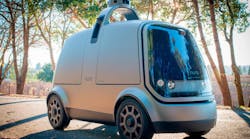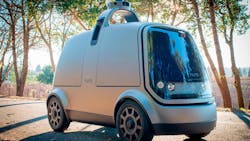This article originally appeared on eenewseurope. It is published here with permission.
Robotics startup Nuro (Mountain View, Calif.) has unveiled an autonomous vehicle intended for delivering local packages—not people. Launched last year, Nuro was founded by two ex-Google engineers that had previously worked on the tech giant's self-driving car project. Now, they say, with their new venture they are focused on "delivering the future of local commerce, autonomously."
Their first project is a fully autonomous, self-driving electric vehicle for local goods transportation. Designed from the ground up "to keep what's outside even safer than what's inside," the vehicle has no need to accommodate human passengers and features no standard doors or windows.
The fully autonomous electric delivery vehicle developed by Nuro doesn't include a seat for a human passenger.
It also has no traditional manual driving controls such as a steering wheel or pedals, or even a seat for a human passenger. The vehicle's interior is customizable—with options such as racks, hangers, cargo bays, and refrigeration—to accommodate up to about 250 pounds of various types of goods.
The vehicle reportedly weighs about 1,500 pounds—most of which is from its battery pack. In terms of size, it's about the same length and height as a conventional SUV, but only about half of the width, making it safer and easier for other vehicles to maneuver around. The vehicle's sensor array—located on its roof—uses LiDAR, cameras, and radars.
In operation, the company envisions customers using a smartphone app to be notified of planned and actual deliveries. A provided code would then allow them to access the interior of the vehicle and retrieve their item(s). Other technologies, such as facial recognition, are being considered to address potential security or theft issues.
The company hopes to see its vehicles on U.S. roads sometime this year, performing some kind of "useful service." In the meantime, the company says that it is currently in talks with a few major retailers.


